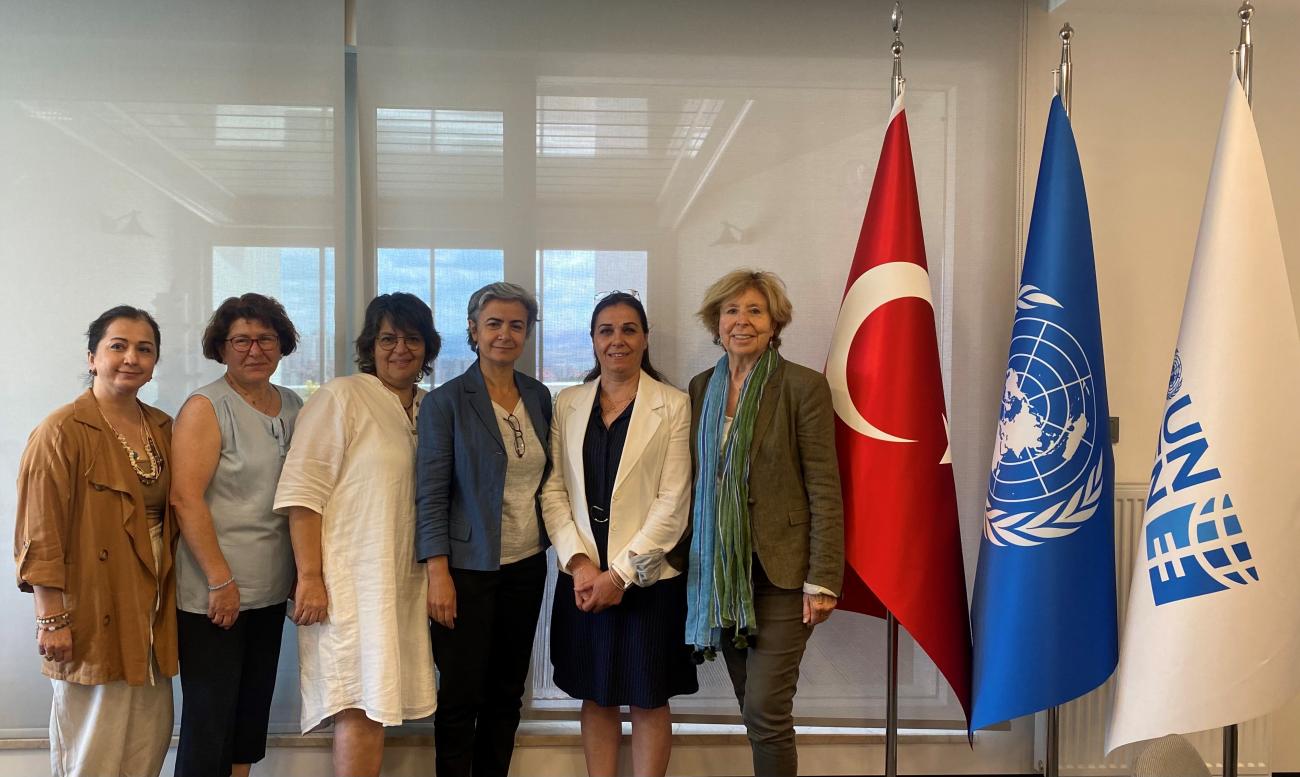Turkish civil society organizations advocate for gender equality at CEDAW committee meeting in Geneva

Turkish Civil Society Executive Committee for NGO Forum on CEDAW, founded in 2002, aims to protect, improve and advocate for women’s rights.
Ever since, the group has participated in the annual meetings of the Committee on the Elimination of All Forms of Discrimination against Women (CEDAW) to reflect on the key concerns and challenges in the treaty’s implementation in Türkiye.
Six activists and members of civil society organizations (CSOs) in Türkiye were in Geneva for the 82nd Session of the Committee on the Elimination of All Forms of Discrimination against Women (CEDAW) between 14 and 15 June 2022. Their presence at the meeting represents a reflection of civil society voices in Türkiye standing against all kinds of discrimination against women and girls.
Adopted in 1979 by the UN General Assembly, the CEDAW Convention is described as an international bill of rights for women. It is a tool that supports women around the world to bring change in their daily life. Türkiye ratified the treaty in 1985 and has been a member ever since.
The Turkish Civil Society Executive Committee for NGO Forum on CEDAW brings together independent and gender equality-focused organizations working regionally and nationally for the promotion and protection of women’s rights. It aims to contribute to the implementation of CEDAW through the preparation of comprehensive ‘shadow reports’, a method for CSOs to supplement the information to reports submitted by governments under human rights treaties. Turkish Women’s Union has been running the secretariat of the Turkish Civil Society Executive Committee for NGO Forum on CEDAW for 20 years.
Huriye Karabacak Danacı, member and Legal Councellor from the Turkish Women’s Union, explains why CEDAW has a critical role in women’s rights around the world: “CEDAW is reviewed by a group of independent experts on women’s rights from around the world, known as the Committee on the Elimination of Discrimination against Women. Every four years, the Committee reviews each national report and addresses its concerns and recommendations as concluding observations,” explains Karabacak.
Ebru Çakır Hanbay, a member of the Foundation for Women’s Solidarity, describes the CEDAW procedures in deeper detail: “First, the national report is submitted by the government. Following the submission, we as CSOs in Türkiye prepare a ‘shadow report,’ impartially reflecting the issues in the implementation of the treaty”. She adds that upon the submission of the reports, the Committee prepares the concluding observations.
“Prepared by multiple CSOs, shadow reports are impactful in advocating for gender equality and women's empowerment in Türkiye. Ever since our establishment in 2002, we are preparing shadow reports for the Committee’s consideration, with the contribution of various women’s rights/women-led CSOs,” adds Zeynep Göknil Şanal, member and Project Coordinator from the Turkish Women’s Union.
Ayşe Gamze Tokman, a Member of the Administrative Board from the Turkish Women’s Union, talks about the CSOs’ responsibilities through the CEDAW sessions: “Our responsibility is advocating and lobbying for the implementation of CEDAW in Türkiye. We come together with the Committee in person and share our observations and impressions on the treaty’s implementation in the past four years.”
On the CSOs’ advocacy efforts through the meetings, Yıldız Lamia Tokman, a volunteer from the Turkish Women’s Union, says that they had bilateral conversations with the Committee members. “It is important that the Committee is in full knowledge of the civil society’s observations to get a bigger picture of the country’s current situation,” says Tokman.
Considering that the CEDAW Committee focused on many points which were also in the shadow report, Demet Erdemir, member of the Administrative Board from Turkish Women’s Union, states that their participation has made a progressive impact through the years: “We see that the Committee considers our shadow report while drafting their questions and concluding observations. To see the impact of civil society organizations in such crucial documents is a sign of what we can achieve when we come together.”
Participating in the CEDAW session for the fourth time as the Civil Society Executive Committee for NGO Forum on CEDAW, the members find it valuable to have young committee members join the sessions for knowledge transfer and a sustainable presence of Turkish CSOs in future sessions.
“CEDAW is invaluable in opposing the effects of discrimination, which include violence, poverty, and lack of legal protections, along with the denial of inheritance, property rights, and access to credit. Bearing that in mind, the Civil Society Executive Committee for NGO Forum on CEDAW aims to continue their work to protect, improve and advocate women’s rights in Türkiye by joining forces and handing down the next generations their know-how to ensure a gender-equal future,” says Zeliha Ünaldı, Deputy Country Director of UN Women Türkiye.
The Committee’s participation in the CEDAW public meeting, where the 8th periodic report of Türkiye was presented, is supported by UN Women under the Strong Civic Space for Gender Equality project, funded by the European Union.

